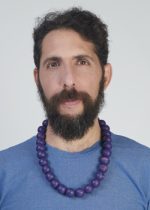Integrating the Whole Brain Training (WBT) Approach in Clinical Practice and Peak Performance
Aida Ivan, PhD
Peter VanDeusen
Zvigidiz Chenman E.
1-day workshop
Date: March 25, 2026
Workshop Title
Integrating the Whole Brain Training (WBT) Approach in Clinical Practice and Peak Performance
Workshop Description
Recent developments in applied neuroscience have shifted the focus of neurofeedback from isolated site training toward network-based approaches that emphasize integration across brain regions. The Whole Brain Training (WBT) framework, originally developed by Peter Van Deusen, provides one example of this systems perspective, aiming to enhance communication, coherence, and flexibility within and between functional networks rather than suppressing symptoms directly.
This workshop will explore how network-oriented neurofeedback principles can inform clinical practice and performance enhancement, regardless of specific software or hardware used. Using case studies drawn from work with clients experiencing autism spectrum disorder (ASD), depression, anxiety, ADHD, migraine, and post-traumatic stress, participants will examine how individualized assessment of brain dynamics can guide training strategies to improve self-regulation, affective balance, and adaptive functioning.
The session will also consider applications in peak performance, highlighting examples from athletics, leadership coaching, and creative professions, where similar neurophysiological mechanisms—such as enhanced synchrony and flexibility—support focus, resilience, and flow states.
Attendees will gain practical insights into how to conceptualize the brain as an interactive network system, interpret patterns of dysregulation, and design training plans that address connectivity and balance. Emphasis will be placed on integrating neurofeedback with HRV biofeedback, mindfulness, psychotherapeutic and behavioral methods to promote sustainable change in both clinical and non-clinical populations.
This workshop encourages critical reflection, discussion, and cross-method collaboration, aiming to deepen participants’ understanding of how network-based neurofeedback principles can enrich diverse therapeutic practices.
Learning Objectives
- 1) Explain the theoretical and neurophysiological rationale for network-based neurofeedback approaches.
2) Recognize patterns of dysregulation in EEG data that relate to clinical and performance outcomes.
3) Analyze case studies illustrating changes in regulation, cognition, and emotional stability following network-oriented training.
4) Integrate neurofeedback principles with psychotherapy, mindfulness coaching, or behavioral interventions to support whole-brain resilience and adaptability.
About Aida Ivan
Aida Ivan is a Certified Educational Psychologist and trainer with extensive experience in supporting students, teachers, and families in both Romanian and international educational settings. Since 2006, she has worked in counseling, learning support, and talent development roles, contributing to the International British School of Bucharest, as well as academic collaborations with the University of Bucharest.
Her professional expertise spans psychological counseling, psychotherapy, school guidance, and the design of inclusive educational programs, strengthened by national certifications as a formator, mentor, and evaluator of professional competences. She presents regularly in seminars, conferences, and collaborative projects with governmental and nonprofit institutions, and has participated in major international forums including the International Forum of School Counselors.
In 2017 Aida founded Living Psychology, a chain of clinics where she is committed to integrating innovative, evidence-based methods into educational psychology. Her current work focuses on neurofeedback as a tool to enhance self-regulation, attention, and emotional resilience in young people. She approaches each learning environment with respect, clarity, and a strong belief in the potential of every individual.
About Peter Van Deusen
Peter began working in neurofeedback in 1992, mentored by Joel Lubar, Ph.D. In 1994 he founded a practice in Atlanta, GA focused away from the standard pathology model. Over a decade the company grew to 4 centers and, over the ensuing 30 years has expanded into Brain-Trainer International (BTI).
Through 2001, he trained multiple clients and developed/supervised trainers in his Atlanta system which culminated in his co-authoring an article with Lubar and Monastra in Neuropsychology. From 2001-2007 he traveled the world teaching 500+ practicum workshops. His Brain-Trainer.com website sold integrated packages of hardware and software combining sophisticated training tools, low costs and ease of use.
BTI now includes distributors in Brazil, Latin America, the EU and Israel. It has developed its Whole-Brain Training model, a brain-based alternative to standard neurofeedback assessment and training. Its proprietary BT2 and TQ8 training and assessment software and unique product for training HEG are sold about equally to professionals and home-trainers, and the system is being adapted to make it accessible to users of other existing systems.
About Zvigidiz Chenman
Zvigidiz Chenman is the founder the Crow-Institute in Israel, specializing in Biofeedback and Neurofeedback in sports and music performance. Zvigidiz is a sports coach focusing on swimming, and complimented his profession with electronic engineering and Neuroscience, adding various technologies to his practice. Zvigidiz Has been training mindsets since 2006, introducing biofeedback and neurofeedback to the practice in 2017.



